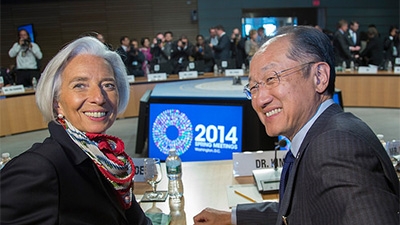A year ago, the World Bank Group won support for the audacious goal of ending extreme poverty. Today, as the 2014 International Monetary Fund-World Bank Spring Meetings wrap up, the Bank Group is close to implementing its strategy to tackle the goal.
The Development Committee, the body that advises the Bank Group and the IMF on development issues, said in its communiqué that it welcomed “progress made in implementing the change agenda,” since it was endorsed six months ago, and called on the Bank Group to “work effectively to complete the reforms.”
“Literally everyone from the advanced countries, from the low-income countries, from emerging countries, all the participants, all the attendees, expressed admiration" for the change process, said Development Committee Chairman Marek Belka, adding that change "is never easy, but has a potential to release a lot more from the excellent group of people that we have in the World Bank Group."
“Today, I was very humbled to receive such a strong endorsement of the change agenda we’ve put forward,” said World Bank Group President Jim Yong Kim. “We have made a lot of progress … and we will continue to focus all of our efforts on improving our ability to serve clients.”
At the 2013 Spring Meetings, the committee backed two goals proposed by the Bank Group: reducing extreme poverty to no more than 3% by 2030, and boosting the incomes of the bottom 40% of the population.
The poverty goal will entail lifting 50 million people a year out of extreme poverty – defined as living on less than $1.25 a day. Kim said this week achieving the goal will require a “laser-like focus on making growth more inclusive and targeting more programs to assist the poor directly.” While “extraordinarily difficult,” the goal can be met, he said. “This can be the generation that ends extreme poverty.”
A new paper, “Prosperity for All,” released April 10 says economic growth is vital to achieving the goals, but must be complemented by policies that allocate more resources to the extreme poor, such as cash transfer programs.

